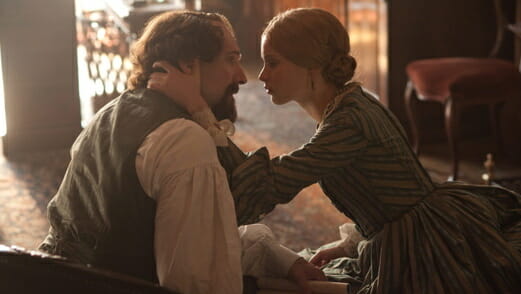
In a year when biopics have taken on subjects as bold and unconventional as Solomon Northup (12 Years a Slave) and Jordan Belfort (The Wolf of Wall Street), making a movie about Charles Dickens could seem hopelessly square. But Ralph Fiennes’ The Invisible Woman is radical and relevant in its own way, bolstering 2013’s rich variety of biographical tales.
That’s partly because, as the title suggests, the film’s focus isn’t strictly on Dickens (Fiennes). The “invisible woman” in question is Nelly Ternan (Felicity Jones), an 18-year-old aspiring actress from a theatrical family who reluctantly falls into a scandalous affair with the celebrated author, despite the facts that he’s 45 and married. The secret relationship leaves an indelible mark on Ternan, and the film announces itself as her story by opening in the year 1883, over a decade after Dickens’ death.
Most of the tale unfolds in flashbacks, linked to Nelly’s present day struggles to come to grips with everything she experienced. It begins innocently enough: As a Dickens fan, Nelly can’t believe her luck at landing a role in a Dickens-directed production of The Frozen Deep, a play written by his friend, Wilkie Collins (Tom Hollander). Nelly’s role is small, but Dickens is instantly smitten with the intelligent, alluring young woman and is soon openly courting her, much to the concern of Nelly’s status-conscious stage mother (Kristin Scott Thomas, sparingly but smartly used).
Nelly isn’t entirely comfortable with the attention herself, though she obviously feels a deep connection to the man whose writing she adores. There’s no clear path to happiness for the would-be couple, especially not with Dickens’ wife, Catherine (Joanna Scanlan, immensely affecting in a breakout role), the mother of his 10 children, standing in the way.
By focusing on Nelly, screenwriter Abi Morgan (who also scripted Shame,, The Iron Lady and the TV series The Hour) avoids turning this into a standard story of celebrity midlife crisis. Using historical novelist Claire Tomalin’s scrupulously researched book as source material, Morgan’s script successfully conveys the complicated emotions in play from all sides of the extramarital love triangle. It’s a credit to that exquisite balance that we fully understand the intellectual and physical attraction between Dickens and Nelly, but also feel Catherine’s painful resignation with her husband’s cruel behavior.
As both a director and leading man, Fiennes masterfully paints Dickens as a great man whose artistic achievements do not prohibit deep character flaws. In one memorable sequence, Dickens pays off a prostitute to leave the streets for the night. It’s an action that resonates all the more when Nelly angrily (and not unfairly) accuses him of treating her like his whore. (And that’s before they’ve even consummated their relationship.)
First and foremost, The Invisible Woman is Nelly’s story, and Jones seizes the opportunity to shine. Hailed as a breakout star after her turn in the Sundance prize-winner Like Crazy, Jones not only makes good on the hype here, she exceeds all expectations in her most nuanced and demanding screen role to date. She essentially has two different roles—the quiet, world-weary loner of the present day and the more wide-eyed, innocent teenager—and Jones sells the transformation with fierce intelligence and a unifying poise. It’s easy to see not only why Dickens would be attracted to her, but why she in turn would feel so conflicted about the attraction.
In addition to getting great work out of his ensemble cast, Fiennes demonstrates a keen eye for sophisticated visuals and period detail. The costume design may well be Oscar bound, and the cinematography is even more striking. Fiennes and director of photography Rob Hardy (Boy A, Shadow Dancer) explore arresting visual motifs that include the positioning of Nelly as a tiny speck against vast landscapes during her morning walks along the shore and the recurring use of doors, windows and other frames to represent the ways in which both Nelly and Dickens are trapped by society and social status. This is only Fiennes’ second directorial effort—following the gutsy 2011 Shakespeare adaptation Coriolanus—but it’s already clear he’s as indispensable a director as he is an actor.
Director: Ralph Fiennes
Writer: Abi Morgan, based on the book by Claire Tomalin
Starring: Felicity Jones, Ralph Fiennes, Kristin Scott Thomas, Joanna Scanlan, Tom Hollander, Perdita Weeks, Amanda Hale, Tom Burke
Release Date: Dec. 25 (limited)